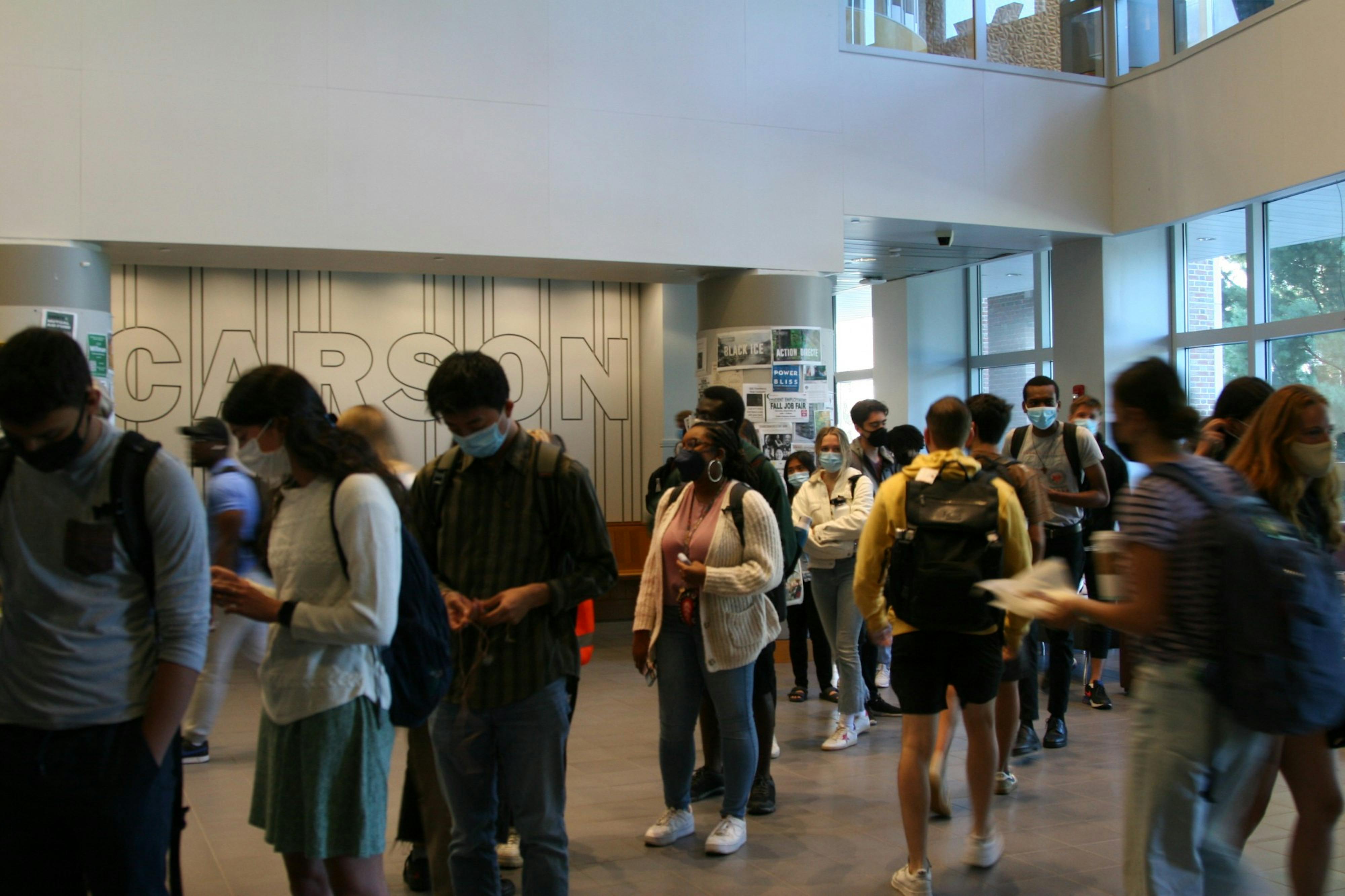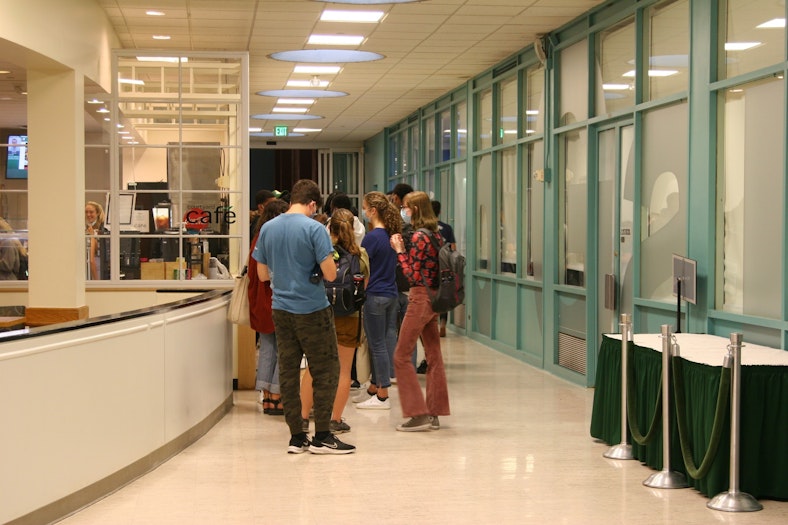DDS director Jon Plodzik advised students to grab meals during low-volume times.

The long DDS lines have left some students with no choice but to resort to unhealthy meals or no meal at all.
As hoards of students return to campus for the start of fall term, many have expressed frustration with long lines at Dartmouth Dining Services locations around campus.
Ethan Dixon ’24 said he had learned to balance his part-time job at Collis Cafe last year with school work and other commitments. Yet, at the start of this term, he said he was unprepared for the shifts during which he would serve a constant stream of students.
“Last year it was so chill — I would just sort of sit back and make a couple of orders,” he said. “But this year, I work four-hour shifts, and I’ll be dishing meals the entire four-hour shift.”
Dixon said he thinks the higher number of students on campus is one of the causes of the longer wait times. However, he said he believes the primary reason for the long lines is a labor shortage at DDS.
“I think the deeper issue is the College’s ineptitude in hiring enough workers,” he said. “There’s a pretty big labor shortage in all the dining locations — I can only speak on Collis, really — but I’ve heard about shortages in other areas, and that’s a lot of the reason why we can't open late night.”
In an email statement, DDS director Jon Plodzik wrote that “pandemic concerns, severe labor staffing challenges and supply chain issues” have proven challenging for DDS. Plodzik added that although no one on the DDS staff lost their job due to the pandemic, the labor shortage has delayed the much-anticipated opening of snack bars around campus as well as late-night options at Novack Cafe and the Courtyard Cafe in the Hopkins Center for the Arts.
Currently, he said, DDS human resources is “working tirelessly” to find new employees — including 150 additional student workers.
In a separate email statement, Plodzik wrote that the staff shortage is “clearly a result of the pandemic.”
“We have never had such difficulties attracting and hiring staff,” he wrote. “It is a national phenomenon as [evidenced] by every service business you go [to].”
He added that DDS lost workers who were concerned about working in a pandemic for health and family reasons, while other part-time help never returned.
“Hopefully things will get more positive in relation to hiring quality applicants and we can return to a more normal level of staff to serve the community,” he wrote.

The Courtyard Cafe has seen lines extending as far as Hinman Mail Forum.
According to Piper Stevens ’25 and Jordan Miller ’25, the long lines have made it difficult to balance meal time with in-person classes and activities. Stevens said she frequently struggles to find time to eat in between volleyball practice and class because there are no quick options.
“I have 30 minutes in between my end of class and lift training, so if I want to go to [the Class of ’53 Commons] there would be almost no way for me to go,” she said. “Then, in the evening, there [have] been times when we go straight from practice to team meals, and there [have] been times I’ve had to skip a meal because the line was too long and I couldn’t get in.”
Miller explained that it’s been difficult for students to eat balanced meals, as unhealthy meals are quicker and more easily accessible.
“A lot of people will be deterred by the really long lines and won’t get the food that they want, or will only be willing to wait in one line, so they’ll end up eating cereal instead, or just chicken and not a salad, for example,” Miller said.
Nicolás Macri ’24 said his back-to-back classes in the middle of the day make it difficult to grab lunch on the go. He added that the exceedingly long lines at the Class of ’53 Commons sometimes leave him no choice but to skip dinner.
“At dinner time, you might have a lot of club commitments and whatnot, so you can only get dinner quickly,” he said. “When the line is very long at [the Class of ’53 Commons], you sort of just get discouraged and put it off until later, and sometimes that means you might not be able to eat that day.”
Some students had hoped they could grab late night as a substitute for dinner, but the delay in the start of late night service has eliminated this possibility. Dixon added that he consistently struggles to find food when his work shift at Collis ends.
“Honestly, I’ve had to order Dominoes a couple of times,” Dixon said. “That's another issue: nothing’s open when I get off at nine, and so now I just have to take food home from where I work.”
According to Plodzik, Novack Cafe resumed normal hours of operation on Monday and will stay open until 12 a.m. Sunday through Thursday going forward. He wrote that he believes DDS will have enough staff to keep the Courtyard Cafe open until 12 a.m. daily starting Sept. 26.
“I realize, as does all of the staff working in dining, that these additions can’t come soon enough,” he wrote. “We simply are doing the best we can under these circumstances, and realize they are not all optimal for everyone at this time.”
Peer institutions are also grappling with long lines as schools transition from virtual to in-person instruction. The Daily Princetonian reported on Sept. 13 that Princeton University’s dining services were experiencing a severe staff shortage, and the Brown Daily Herald reported on Wednesday that students are experiencing “overcrowding, prolonged wait times and dissatisfaction with meal options.”
Dixon noted his disappointment with the College’s failure to attract new DDS workers.
“The College really flunked this one in that they didn’t realize there would be a labor shortage, and they didn’t raise the wages enough or advertise these positions enough to make up for it,” he said.
Plodzik recommended the GET mobile app, on which students can use their DBA to order food ahead of time and potentially cut down their wait time. He also suggested a number of ways to avoid inconvenient lines, such as visiting dining spaces during low volume hours.
“Just like any good restaurant that has a wait for a table on Saturday night at 6 p.m., visiting any of our locations at peak times will result in a delay for service,” Plodizk wrote. “I encourage everyone to consider coming to dinner outside of the hours of 6 p.m. to 7:30 p.m. on campus to avoid that congestion.”
On Thursday, a sign appeared in the entryway to ’53 Commons advising students on how to “beat the crunch when you come to lunch.” High volume times to avoid for lunch service, it states, are 11:30 a.m., 12:55 p.m. and 2:20 p.m. on Mondays, Wednesdays and Fridays, as well as 12:15 p.m., 1:25 p.m. and 2:35 p.m. on Tuesday and Thursday.
"wait" - Google News
September 24, 2021 at 04:17PM
https://ift.tt/3EYb4qj
Labor shortage strikes DDS as long dining lines force students to wait, skip meals - The Dartmouth
"wait" - Google News
https://ift.tt/35qAU4J
https://ift.tt/2Ssyayj
Bagikan Berita Ini














0 Response to "Labor shortage strikes DDS as long dining lines force students to wait, skip meals - The Dartmouth"
Post a Comment